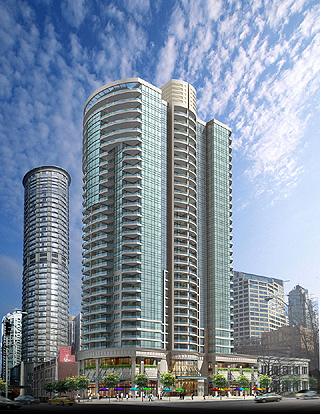
Cary Kopczynski & Co.
Speciality: Structural engineering of commercial and multifamily residential buildings and parking structures
Management: Cary Kopczynski, CEO
Founded: 1985
Headquarters: Bellevue
2006 revenues: $4.5 million
Projected 2007 revenues: $5.4 million
Current projects: Enso, a 20-story condo and 12-story office building designed by Callison for Vulcan Inc.; Escala, a 31-story luxury condo designed by MulvannyG2 for Lexas Companies; Kinects, a 40-story apartment designed by Bumgardner for Security Properties

Image courtesy of Cary Kopczynski & Co. Cary Kopczynski & Co. specified very high-strength rebar for the Escala condo tower in Seattle.
|
To Seattle’s concrete guru Cary Kopczynski, ultra high-strength rebar is one of the greatest inventions in years.
“With all these high-rise buildings going up in Seattle, we think this is a real bright spot,” he said.
The higher you build in an earthquake-prone region like Puget Sound, the stronger your concrete frames have to be. To make those frames earthquake-proof, you have to use very heavy reinforcing steel.
“You need high quantities, and it’s very intricate and it slows down construction,” Kopczynski said.
CKC wanted to use a very high-strength rebar with a yield strength of 100 ksi in the Escala, the 31-story condo tower going up in downtown Seattle.
This rebar is 67 percent stronger than the rebar they would otherwise use, but it wasn’t permitted in the building code.
It took the better part of a year to convince Seattle’s planning department to grant CKC a code exemption.
The Escala is likely to be the first building in North America to contain this high-strength rebar, according to Engineering News Record.
But it won’t be the last.
The 2009 International Building Code will allow it, Kopczynski said.
He should know — he sits on the committee which writes the concrete building code.
“We think the lid is off the pot,” he said.
Overseas workers
Finding good engineers is always a challenge for this firm, which is well-known for designing reinforced concrete structures.More and more, the firm looks abroad when it needs to hire.
“At last count we had 10 nationalities on our staff,” Kopczynski said.
When you consider that the entire firm has fewer than 40 people, that makes for a pretty diverse group.
But complying with immigration laws and dealing with federal authorities is a constant headache.
“Man, they don’t budge,” he said. “And they’re expensive. And time consuming.”
One CKC employee spends about half of her time handling immigration issues, he said.
But the diverse group of employees has an upside: it gives the firm access to new markets. Thanks to a contact arranged by a Korean-born employee, CKC may soon enter into a consulting agreement with a consortium of Korean builders.
“The Koreans tend to build most all their bigger structures in concrete,” he said, “but some of their bigger systems are just inherently slow.”